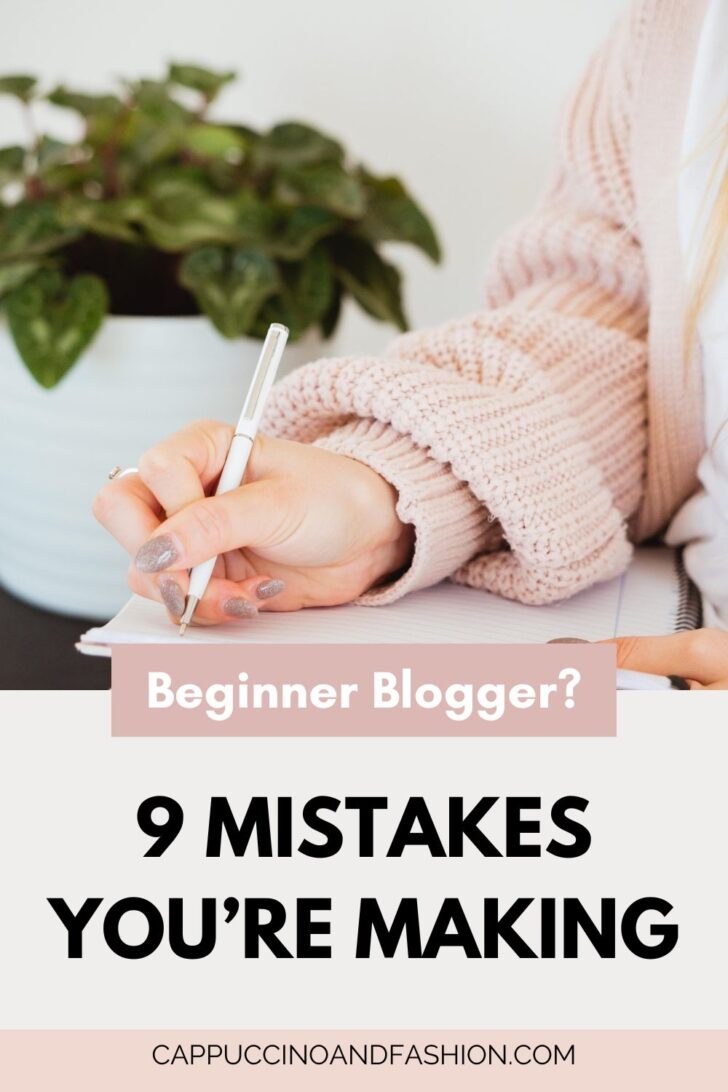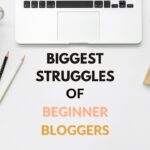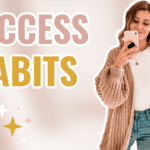This post may contain affiliate links, meaning I make a commission if you purchase through my links, at no extra cost to you. Disclosure here.
If you’re a new blogger, then you’re probably making these mistakes.
But please don’t feel bad if you’re reading this. I have made all of these mistakes myself.
This is just for you to learn from and to hopefully improve, so that you can start making money with your blog much faster than I did.
Back when I started, I had no idea about any of these things, and I had to learn along the way. That’s why I’m writing this for you, so that you can skip these mistakes and get there faster.
I’ve got 9 mistakes to share with you.

Freebie to help you avoid common blogger mistakes
Just quickly before we get started, I wanted to mention a freebie that you will probably find really helpful.
It’s my free 12-Month Blog Plan where I share with you exactly how to start your blog from scratch and within 12 months get it to a point where it’s actually making money for you.
This plan includes how to promote your blog, how to get traffic to your blog posts, how to monetise, month by month, step by step.
9 Blogging Mistakes that Beginner Bloggers Make
Scrolly-scroll below to read them or watch the video:
Mistake #1: Starting on a free platform.
There are lots of platforms you can start your blog on. Some of them are free and they offer you a space for you to write your articles on – I actually started on one of these .
The thing is, if you start on a free platform, you don’t actually own your blog. And this will come with a whole set of issues further down the line.
It will also come to a point where you will think, ‘I need to change it, I need to buy my own blog, to own my own website, because I want to monetise it properly.’
Then you will have to face the ‘Oh, now I need to switch all of my blog posts from this free platform to my own platform. I need to make sure all the links still work,’ and it’s just a hassle. Trust me, I’ve been through that switch myself.
My advice?
Start your blog with your own domain and hosting.
If you’re a new blogger, I highly recommend you start your blog with Bluehost. It’s super inexpensive and it gives you your own domain and your own WordPress hosting for your blog.
Nowadays, I use Big Scoots just because I needed more bandwidth for my blog because I get more traffic, and it’s more of a high-end type of hosting.
As you go further in your journey, you might need to upgrade even more.
But for beginners, Bluehost is brilliant. I’ve used it in the past, and it’s really, really helpful.
Mistake #2: Thinking of blogging as journaling.
This might have worked 10 or 15 years ago, but it doesn’t work nowadays.
Blogging is not journaling; it’s not like writing ‘Dear diary, here’s what I did today.’ It is so much more than that.
You will need to think about your blog like this great website that’s got lots of helpful articles on it.
It’s a place where people can come to find answers to their problems and to their questions on a certain topic.
When somebody types in Google a question about the niche that you’re in and it’s a topic you wrote about, you want them to find that article that you wrote, and to find the answer to their question.
That’s what your blog is about.
It’s about giving people a helpful resource and helpful content to give them a hand with this issue that they have.
I’m not saying you can’t infuse your personality and your experience in your blog posts.
Definitely do, because people do want to hear from real people who’ve gone through similar things.
But the way that you structure your blog post, the title and content, it all needs to be aimed at answering that question that they’re looking for on Google.
Yes, it will be sprinkled with your experience, with how you went through a certain issue, how you did a certain thing.
It will be from your personal viewpoint.
But this is still very different from a journaling page.
Mistake #3: Creating short blog posts.
This again used to work back in the day.
People were writing 300-word blog posts, and they would pop on Google.
But these days, it’s a lot more competitive.
What you need is long-form content. And long-form for Google means usually over 1,000+ words.
This is not an exact number, it sometimes depends on your niche, the topic you’re writing on, and the competition.
If there are lots of other blog posts that are much longer on the same topic, much more valuable with a lot more content in there, Google will obviously favour those instead of a really short one.
Because Google will think, ‘Oh, that blog post is really helpful; I’m going to promote this blog post that’s long and informative as opposed to this one that has only 300 words because it’s likely not to be as helpful as the one that has 2,000 words.’
Of course, some people just fluff up their blog posts to reach that word count. But algorithms are getting smarter and smarter each day.
The point is for you to write valuable content and to fill your blog post with words that actually bring value for your readers.
You don’t want to just have fluff in there.
I would recommend writing blog posts that have at least 1,000+ words.
Most of my blog posts these days are around 2,000-3,000 words per blog post.
It depends on the topic, but that’s my aim. I try to make it long-form.
I would rather have just one blog post a week or even less than that, but make it a good long-form one, rather than writing 10 short ones daily.
Mistake #4: Not optimising your blog post for SEO.
For ranking in Google search, you need to pay attention to SEO (search engine optimization).
You want your blog posts to rank in Google, because that’s how you’re going to get a lot of traffic.
Other platforms can obviously help you get traffic as well, but I do think Google is much more reliable in that sense (though of course you can also use Pinterest to get traffic as well).
Optimising your blog post means doing keyword research.
It means choosing a good optimised title for people to find your blog post.
It means writing long-form blog posts, having good headings in your blog post where you answer people’s questions from Google.
There’s a lot that goes into creating a blog post that will work in Google search.
If you want more info on this, I did a blog post that’s all about how to rank your post number one in Google search.
Mistake #5: Not starting an email list right away.
I highly recommend you start an email list as soon as possible.
I did not do this for the longest time, and I’m definitely kicking myself a bit for that.
I didn’t know back then that I needed an email list. I would hear about it, but I always thought, ‘Oh, this is just old-school marketing; I don’t need that, I just need social media.’
Let me tell you, email marketing is very much still here.
It’s actually the best way for you to market, whether it’s your blog, your paid products, whatever you are doing online, whatever you’re selling, whatever you’re creating.
Email marketing is vital.
It’s like your safety net.
For example, you go on the H&M website to buy something. Do they ask you to follow them on Instagram? Probably not, but they will give you something like a 10% discount for you to join their email list.
That’s for a reason: they know the importance of email marketing.
They know an email list will get them more sales than getting you to follow them on Instagram.
So start an email list right away, even if you don’t necessarily have something to sell or you don’t know what you’re going to email.
That’s okay.
Just start small but have a way for people to sign up on your email list.
Personally, I use and recommend Flodesk for your email marketing. It’s the most inexpensive platform I have found that still delivers everything that I need in an email marketing platform.

Mistake #6: Not interlinking your blog posts.
This is something I also didn’t do for the longest time ever, or I barely did.
When you write a blog post, think about your old blog posts that you’ve written and ask yourself if you can link to any of those in your current blog post.
Sometimes I go to my old blog posts and I insert links to my newer blog posts.
You want to constantly have your blog posts linking from one another – obviously in a way that makes sense.
In my case, if somebody reads my blog post on starting a YouTube channel, and then I have this blog post that talks about how to make money on YouTube, then I want those to be interlinking to each other.
Because chances are that if somebody reads one, they will be interested in the other one too.
This way, you offer more information and value to your readers and you also get more views. Google will see that people are spending more time on your blog, and it will rank your blog posts higher because of that.
Mistake #7: Focusing too much on the right niche.
So many people say that ‘you need to niche down’, ‘the riches are in the niches,’ and so on.
I did a whole blog post on this topic, about not having to niche down because actually, you don’t need a niche.
I know many people get hung up on this, they even stop creating content altogether, or they don’t even start because they feel like they haven’t figured out just the ‘right’ niche.
That makes me sad, because you could be getting so far along in your journey and start making money.
Yet this mindset of, ‘I just don’t have it all perfectly figured out, I don’t have that niche figured out, so I’m just not gonna do it,’ – this is holding you back.
Just start, even if you don’t have the ‘right’ niche.
Look at my blog: it actually encompasses a variety of topics that sometimes you might not think are necessarily related, and that’s fine.
Google still promotes blog posts that are related to online business from my blog. It also promotes blog posts that are motherhood-related or minimalism-related.
It doesn’t matter.
Your blog can have a variety of topics; it doesn’t have to have just one.
So stop obsessing about the niche and just start creating the content.
Mistake #8: Not doing audience research and keyword research.
You want to know who you’re writing your blog posts for.
I did mention you don’t need a niche, but I would say it’s helpful if you can know who you’re talking to.
For example, for my motherhood blog posts, I’m obviously talking to mums.
For minimalism blog posts, I’m talking to maybe moms, maybe women (as my audience is mostly female), but mostly people in general who are interested in decluttering or minimising their home.
If I’ve got online business posts, then those are obviously geared towards beginner entrepreneurs who want to start an online business.
But even in all of those categories, I do want to understand my audience.
Where are they now?
Where do they want to be?
What kind of problems do they face right now?
And that’s the kind of content I create, even on my YouTube. I have in mind myself 8 years ago or 10 years ago when I first started my blog or my YouTube channel.
What I didn’t know or what I wish I knew, and that’s the kind of content I’m creating.
Having that ideal audience in mind will really help you create helpful content that will actually do really well.
It also helps to do your keyword research to find topics that your audience is actually searching for on Google. If you need more help with ranking in Google, you might find my Blogging Secrets course helpful.
Mistake #9: Lacking a monetisation strategy from the beginning.
A lot of people assume, ‘Oh, I’ll just get traffic to my blog, and then the money will just come’.
But it doesn’t happen that way.
A lot of people find themselves getting a whole bunch of views or even getting a lot of followers on Instagram or subscribers on YouTube.
Many people assume that the subscriber or follower or traffic number will just equal a certain amount of money.
But it doesn’t.
If you don’t have a monetisation strategy put in place, if you don’t have a way to monetise that traffic, you’re just not gonna make much money from it.
This is why I think it’s really important to start thinking about how you’re going to monetise from the very beginning, even if you don’t have traffic yet.
Maybe you will change your mind on your monetisation options, your strategy will change, you will evolve in your blogging journey.
But it’s important to know how you’re going to start making money right now.
And if you have no idea where to start with monetising, if you have no idea what kind of strategy you could go for, I highly recommend downloading my free 12-Month Blog Plan.
I do go into a lot of different ideas on monetisation, and I think you’ll find it helpful.
Let me know where you are at in your blogging journey, I would love to hear from you in the comments.




